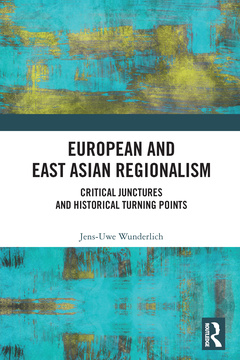European and East Asian Regionalism Critical Junctures and Historical Turning Points
Auteur : Wunderlich Jens-Uwe

Embedded in the evolving comparative regionalism literature, this book offers a systematic analysis of the factors positively and negatively influencing regional institution-building.
The ruptures caused by the Eurozone crises, the coronavirus pandemic and by Brexit have renewed the interest in the impact of crises and critical junctures on regionalism here defined as regional institution-building. Drawing from critical juncture research and historical comparative analysis, this volume uses the cases of European and East Asian regional institution-building to systematically analyse institutional transformations during specific historical turning points and critical juncture moments. Wunderlich?s research offers an in-depth analysis of the interrelated drivers, spoilers and dissolvers of regional institution-building processes in Europe and East Asia, and addresses key questions including: Under what conditions does regionalism take hold? What is influencing the initial institutional design choices? What is the impact of historical experiences and well-entrenched norms and ideas? What are the roles of regional leaders? How do external factors influence regional institution-building? What turns a crisis into a critical juncture and are such junctures threats or opportunities? What accounts for variations in institutional responses to crisis events across different regional settings?
This book will be a valuable resource for scholars of regionalism, region-building, regional governance and international relations of Europe and East Asia.
Introduction Chapter 1 Comparative Regionalism – Mapping the Theoretical Landscape Chapter 2 Post-1945 European Institution-Building Chapter 3 The Emergence of Regional Institutions in East Asia Chapter 4 European Institution-Building and the End of the Cold War Chapter 5 East Asian Regional Institution-Building after the Cold War Chapter 6 Financial Crisis, Critical Junctures and Institution-Building in East Asia and Europe Conclusions: Regional Institution-Building in the Twentieth Century – Evidence from Europe and East Asia
Jens-Uwe Wunderlich is Lecturer in International Relations at the School of Languages and Social Sciences at Aston University in Birmingham, UK. He holds degrees from the Otto-von-Guericke-University Magdeburg and the University of East Anglia in Norwich. His research focuses on comparative regionalism, European integration, East Asian regionalism, forms of postnational actorness and the impact of crises on regional institution-building. His most recent research has been published in the Journal of Common Market Studies and the Journal of European Integration.
Date de parution : 08-2022
15.6x23.4 cm
Date de parution : 10-2020
15.6x23.4 cm
Thèmes d’European and East Asian Regionalism :
Mots-clés :
Regional Institution Building; Regional Core States; coronavirus pandemic; East Asian Regionalism; critical juncture moments; ASEAN Member; Comparative Regionalism; Reform ASEAN; West Germany; FRG; EAEC; Critical Junctures; SED Regime; Classical Integration Theory; Apt Process; ASEAN Government; ZOPFAN Declaration; De Gaulle; ASEAN’s Institutional Development; EDIS; EU’s External Relation; EEC Treaty; Regional Institutional Architecture; Critical Juncture Approach; South Vietnamese; European Institution Building; ASEAN Foreign Minister



